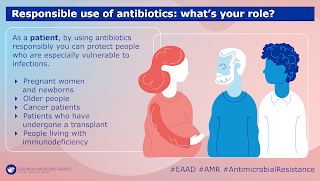 |
| Parthenon, Athens |
The EACPT
Executive Committee is meeting in Athens from 5th – 6th
April 2019 to plan for future activities of the EACPT.
Main topics
for discussion include
- final
details for the upcoming 2019 EACPT Congress to be held in Stockholm from 29th June - 2nd July
in 2019
-
early planning for the next EACPT
Congress, to be held in Athens in 2021, from 26th – 29th
June
-
updates from EACPT Research,
Regulatory and Education working groups
-
EACPT awards
The next EACPT Congress will be held from 29th June to 2nd July in 2019
in Stockholm as a partnership between the EACPT and the Swedish Society for
Pharmacology, Clinical Pharmacology and Therapeutics.
Early bird registration deadline - 10th April 2019. Register online for the 2019
EACPT Congress in Stockholm
The Congress will address Tomorrow's Healthcare Challenges and
will be held at the City Conference Centre - 5 minutes from Stockholm Central
Station.
 |
EACPT committee in Athens by Hippocrates statue.
Back row: Per Ankaer, MCI (Denmark), Pierre Marquet (France),
Vangelis Manolopoulos (Greece),
Markus
Zeitlinger (Austria), Janne Backman (Finland), Caroline Samer (Switzerland) Donald
Singer (UK), Michial van Agtmael
(Netherlands), Achim Schmidtko (Germany). Front row: Jamie Coleman (UK), Tabassome Simon (France), Ylva Böttiger (Sweden), Arantxa Sancho Lopez (Spain), Gerard Rongen (Netherlands).
|
The Congress Reception on the evening of Saturday
29th June, will be held at Stockholm City Hall,
the venue of the Nobel
Prize banquet.
The Keynote Opening Lecture will be given by the President at the Karolinska
Institute, Professor Ole Petter Ottersen, on global health and clinical
pharmacology.
Further awards will be presented, including
Scientific Awards, including Young
Investigator, and EACPT Education Awards.
Around 60 invited speakers are expected from throughout Europe and beyond.
Congress keynote lectures, sessions and themes will include:
- Advanced therapies
- Ageing populations
- Anti-coagulation
- Anti-microbial resistance
- Beating cancer
- Chronic disease
- Clinical drug research of tomorrow
- Clinical pharmacologists versus computers
- Clinical use of pharmacokinetics
- Closing the money gap
- Computers vs. clinical pharmacologists
- Deprescribing
- Drug-drug interaction
- Drug regulation in the 2020s
- Drug utilisation
- EACPT meets Asian
Societies
- Ethics in clinical research
- Global Health
- How to become a clinical pharmacologist
- How to make an oral presentation
- How to measure drug exposure
- How to measure drug use
- How to perform a health economic study
- Inter-professional exchange for better drug
treatment
- Mental health
- Misuse of medicines
- Patient empowerment
- Polypharmacy: joint symposium with the Korean Society (KSCPT)
- medicine: EPHAR-EACPT joint
symposium
- Preparing tomorrow's prescribers
- Prescribing and deprescribing
- Publish or perish
- Rare diseases
- Targeting small populations
- The critically ill patient
- Treating ageing populations
- Treating disease in children
Major awards to be presented at the Stockholm Congress include the EACPT
Lifetime Achievement Award, the biennial EACPT Scientific Award for best
publication on a clinical pharmacology or therapeutic theme, Young Investigator awards jointly with EPHAR, and the EACPT Education Award.
Opportunities for EACPT Associate Members include
* discounted registration fees for EACPT meetings
* networking with colleagues worldwide through the global EACPT network of
Associate Members
* active involvement in EACPT Working Parties and other activities
Future EACPT Congresses will be held in:
- 2021 Athens
- 2023 Rotterdam
The EACPT was founded in 1993 and now includes as members all national
organisations for clinical pharmacology in Europe, as well as organisations
from further afield internationally. The EACPT aims to provide educational and
scientific support for the more than 4000 individual professionals interested
in clinical pharmacology and therapeutics throughout the European region, with
its congresses attended by a global audience. The EACPT also advises policy
makers on how the specialty can contribute to human health and wealth.















